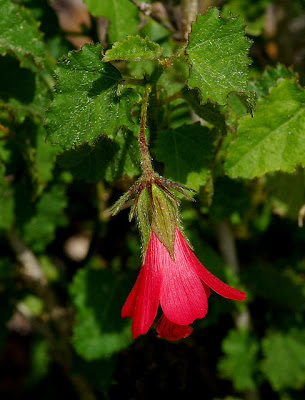Hibiscus poeppigii is a dwarf, shrubby perennial that bears small 1-inch long brilliant red flowers pollinated by bees and hummingbirds. It will produce flowers all year round so long as warm temperatures and adequate soil moisture prevails. Plants in full sun grow 1–4 feet (0.3–0.9 meters) tall and about half as wide and bear leaves 1–2 inches (2.5–5 centimeters) long. The stems will grow taller and the leaves larger if plants are situated in the shade or are overtopped by taller plants.
Hibiscus poeppigii is readily propagated from seed which germinate in about 10 days if sown during warm weather. It makes a delightful pot plant and I have grown it from seed to flowering in about 4 months in an 8-ounce (0.24 liter) plastic cup. In the ground, plants will rarely exceed 1.5 feet (0.46 meters) tall and be rather twiggy and sparsely leafy if grown in a dry, sunny spot. Of course, plants will grow much taller and be more lush if grown in continually moist soil or in part shade. Since it is the smallest of all Florida native hibiscus, and because it begins to flower when scarcely 6-inches (15.24 centimeters) tall, it is referred to as fairy hibiscus, a name which I much prefer over the prosaic and literal common name of Poeppig's hibiscus.
Hibiscus poeppigii is a state-listed endangered plant in Florida, where it occurs only in Miami-Dade County and the Monroe County keys. It also occurs as a native plant in the Caribbean (Cuba and Jamaica) as well as in Mexico (from Tamaulipas to Yucatán and Chiapas) and Guatemala. Taxonomically, it belongs to section Bombicella of the genus Hibiscus. In the New World, the section is centered in Mexico and Hibiscus poeppigii is the only representative of section Bombicella that is native east of the Mississippi River.
Reference:
Fryxell, Paul A. 1980. A Revision of the American Species of Hibiscus Section Bombicella (Malvaceae). Science and Education Administration, United States Department of Agriculture Technical Bulletin No. 1624. Internet
Image and text © 2012 Rufino Osorio

1 comment:
Very interesting, I'd not seen it before.
ct
Post a Comment